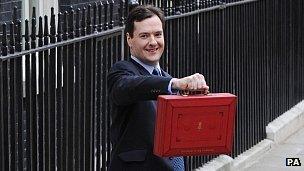Cameron 'will listen' to charity concerns over tax relief
- Published

Charities say the plan announced in last month's Budget was a "bombshell"
David Cameron has said he will listen "very sympathetically" to concerns from charities about the impact of a planned cap on tax relief on donations.
Philanthropists have criticised plans to put an annual limit on tax reliefs, including for charitable donations, saying it will deter giving.
The PM said use of donations to cut tax bills must be curbed but the "right balance" could be struck.
Labour said the plan is "another nail in the coffin" of the Big Society.
When higher rate taxpayers donate money to charity, some of the tax can be reclaimed. If they choose to give away all their income to charities, effectively they could pay no tax at all.
On Tuesday the Daily Telegraph reported that a confidential study by HM Revenue and Customs had found the use of tax reliefs on charitable donations was among the top three tax loopholes used to legally reduce income tax bills.
Tax avoidance
Limiting the total amount of relief someone can claim in a year - including on charitable donations - to £50,000 or 25% of income was part of a strategy announced in last month's Budget to tackle "aggressive" tax avoidance.
Campaigners say tax avoidance is losing the Treasury more than £13bn each year.
But leading philanthropists have said equating charitable giving to tax avoidance is wrong and damaging at a time when ministers are trying to encourage greater private funding for the arts and community involvement in voluntary projects.
They argue that philanthropists give away far more than they claim back in tax relief.
Speaking in Indonesia, during a trade tour of East and South East Asia, the prime minister defended the proposal amid newspaper reports that ministers might be reconsidering its impact on UK-based charities.
"I am in no doubt that there is a problem with some people who are using a range of tax allowances to reduce their effective tax rate down to a very low rate, often single figures," he said.
"Some people have been using charities established in other countries to funnel money into those so they are not paying 50p tax or even 45p tax but in some cases paying 10% or 20% tax."
'Another blow'
Mr Cameron said he believed the "right balance" could be struck between ensuring the wealthiest paid the appropriate amount of tax while not discouraging them from supporting important causes.
"George Osborne said he would very carefully look at the effect on charitable donations because we want to encourage charitable donations," he added.
"We will look very sympathetically at these concerns but there is no doubt abuse is taking place. We are very clearly informed of that by the Inland Revenue who are responsible for these matters."
Two Conservative MPs - Conor Burns and Mark Pritchard - have urged ministers to review their approach, suggesting the plans will not encourage philanthropy.
And Labour said charities had seen their public funding cut since the coalition came to power and this was "another blow" to voluntary organisations and the philanthropists who backed them.
"Those who are abusing reliefs to cut their taxes must be stopped," said shadow Cabinet Office minister Gareth Thomas.
"But George Osborne did not announce a cap on reliefs out of principle. He did so in a last-minute panic to try and deflect criticism of his decision to cut the 50p tax rate... In their rush, the Tories did not think through the impact on charities."
Under the government's Big Society plans, ministers envisage charities and voluntary groups taking of providing alternatives to state-run services or, in some cases, taking over their running.
"David Cameron's cuts were already squeezing the life out of the Big Society," Mr Thomas added. "David Cameron's latest attack on philanthropists has put another nail in its coffin."
'Serious damage'
Sir Stephen Bubb, from the Association of Charities and Voluntary Organisations, said the move was a "bombshell" for charities and charitable giving should not be "bracketed with" efforts to reduce tax bills.
"Rich people who make donations to charity are not gaining personally," he told the BBC.
"The whole point of the reliefs is to encourage more giving. Many charities rely on very big donations to do a lot of their work.
"If you have a cap which stops that giving that is very seriously damaging society."
- Published10 April 2012
- Published10 April 2012